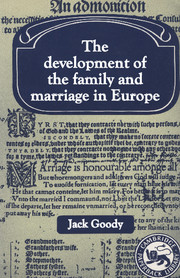Book contents
- Frontmatter
- Contents
- List of figures, maps and tables
- Preface
- 1 Perspectives
- 2 Two sides to the Mediterranean
- 3 Change in the German lands
- 4 Cousins and widows, adoptees and concubines
- 5 From sect to Church
- 6 Church, land and family in the West
- 7 Reformation and reform
- 8 The hidden economy of kinship
- 9 The spiritual and the natural
- Appendix 1 Kin groups: clans, lineages and lignages
- Appendix 2 From brideprice to dowry?
- Appendix 3 ‘Bilaterality’ and the development of English kin terminology
- References and bibliography
- Glossary
- Index
4 - Cousins and widows, adoptees and concubines
Published online by Cambridge University Press: 05 June 2012
- Frontmatter
- Contents
- List of figures, maps and tables
- Preface
- 1 Perspectives
- 2 Two sides to the Mediterranean
- 3 Change in the German lands
- 4 Cousins and widows, adoptees and concubines
- 5 From sect to Church
- 6 Church, land and family in the West
- 7 Reformation and reform
- 8 The hidden economy of kinship
- 9 The spiritual and the natural
- Appendix 1 Kin groups: clans, lineages and lignages
- Appendix 2 From brideprice to dowry?
- Appendix 3 ‘Bilaterality’ and the development of English kin terminology
- References and bibliography
- Glossary
- Index
Summary
Towards the middle of the first millennium A.D., changes were taking place in the kinship systems of Europe that involved a break with earlier practices and made their mark for centuries to come. These changes appear to have been connected with the advent of Christianity, but they were derived neither from the sacred books, with their Israelite and Palestinian background, nor yet from the Graeco-Roman world from which its exponents came. Both these worlds adhered to ‘Mediterranean’ practices; Christianity introduced a new element.
As we saw in the previous chapter, some of the emergent features of European kinship are embodied in the Letter of Pope Gregory to Augustine. Others are referred to elsewhere in Bede and in the works of various writers of the period. They included the difficulties placed in the way of divorce, which increased still further with the ecclesiastical reforms of the eleventh century (Bouchard 1981); the encouragement of spiritual kinship (godkinship) in preference to consanguinity; the insistence on the consent of the parties, and the affection of the partners, in any marriage. I will concentrate first of all on those four features that emerged from Augustine's encounter with the Anglo-Saxons – cousin marriage, marriage to affines, adoption and concubinage. Let me begin with the history of prohibited unions, since this is one of the most politically visible features of the development of Christian marriage and one that became particularly prominent in England at the time of the Reformation.
- Type
- Chapter
- Information
- The Development of the Family and Marriage in Europe , pp. 48 - 82Publisher: Cambridge University PressPrint publication year: 1983



